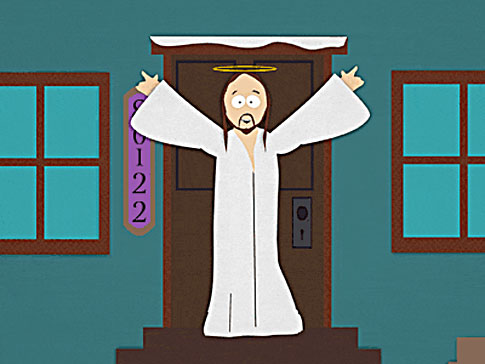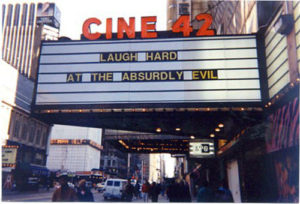I can only bow to the late, acerbically great Chris Hitchens, who beat me (and most everyone else) to this point, the one about mocking religions, nearly 10 years ago and in a far more hyper-articulate, ferociously jaundiced manner, as was his way.
Hitchens would be apoplectic, I imagine, over the savage attack on the Charlie Hebdo satirical newspaper in Paris, which killed 12 and instantly re-ignited the blundering debate about religious tolerance, freedom and the rough intersection of satire and religious extremism.
But one thing seems slightly different, this time. So far, the reaction from editors and newspapers worldwide has been, if not openly derisive of extremism, not as panicked (and immediately censoring) as Hitchens wrote about in 2006. And in fact, many outlets are openly running Hebdo’s Allah cartoons (though of course, many are not, and are acting very tentative indeed). Will the heavens crumble?
Contrary to common wisdom, cartoon depictions of Allah aren’t explicitly forbidden by the Quran, and most Muslims, even most fundamentalists, don’t care about them in the slightest. (For more about what Muslims really believe about cartoon depictions of Mohammed, check out this Think Progress summation).
Not that Americans ever really experience this issue directly. The ghosts of 9/11 aside, radical Islam is almost nowhere in our immediate culture, and factors little in the day-to-day editorial discussions of any major media outlet – as evidenced by the only genuine media “crisis” we’ve suffered of late: the momentary suspension of a lame stoner flick by an autocratic clown car called North Korea.
With this in mind, I do have one small anecdote to offer to this debate; it’s a quick story meant to illustrate one aspect, one way of holding religion and satire in the modern progressive mind. It is by no means any sort of solution to the very serious threats France, and so many other countries, face on a daily basis; does one exist when it comes to dealing with radicalized sociopaths with guns?
The anecdote goes thusly: Years back, SFGate had a manager – let’s call him Howard – an ill-spirited supervisor who was not at all admired in our office and was never much of a fan of my work, to the point of frequent duress. Howard’s disposition, not to mention his poor management style, served our organization not at all and, mercifully, he did not stick around long.
Nevertheless, Howard did manage to conjure one notable hunk of respect from me while he was here, over this one specific, and quite splendid, event: He laughed at the Mormons.
The LDS, you see, does not much enjoy being satirized. The church’s many dazzling defects as a religion and sloppy failings as a cult lend to all sorts of easy (yes, often too easy) denunciations, and I’ve rarely hesitated to take them on for reasons both silly (polygamy, underwear, Joseph Smith’s endless revisions to his own “divine” scriptures to suit his sexual, uh, quirks) and deadly valid (Prop 8, gay conversion therapy, sexism, brainwashing, et al).
Thus it was that one fine day, two quite displeased representatives from the LDS came to the Chronicle. They marched into my manager’s office, wishing not only to file a complaint against me, but to actually threaten legal action against the Chronicle, in the hopes of getting me in serious trouble. Terrific.
They weren’t stupid. They knew such lawsuits never stick. No matter how hard I tried, it’s impossible to libel an entire religion, even absurd ones. What my two Mormon friends did know what that such “nuisance” lawsuits can be expensive; their hope was that their threat would ultimately silence my Mormon streak, if not get me fired.
My boss, to his remarkable credit, laughed them out of his office. The lawsuit never materialized, and they never came back.
Howard came to my desk (back when I had a desk, and an actual staff position – ah, relics) immediately afterwards, a big grin on his face. He explained the scene that just transpired, and as the blood rushed back into my face, a terrific rule not merely of journalism, but of religion, and even life itself was made clear. It’s exactly what he told the Mormons, and I’ve championed it, in one form or another, ever since.
It goes like this: If your great and powerful religion – presumably a well established, deeply devout, time-honored vehicle of fervent moral goodness, one that’s directed by an all-seeing, all-knowing supreme deity of love who inhabits and animates all of time and space at once, if your grand creation cannot tolerate a joke, cannot stand to be criticized, is too weak to abide even the most silly or disrespectful of left-wing jabs from a single tiny human, your religion is no religion at all, and should perhaps consider another line of work.
It’s an easy rule to scale up, to apply to issues both dire and recent. How small, pathetic, vengeful must your god be that he/she/it cannot be casually depicted by a satirical newspaper, without threat of violence or death? How cowardly and untenable is your faith’s message that teasing about it might lead believers toward “false” gods or (heaven forefend) independent thinking?
On the left is a Charles Hedbo cartoon. There are many more just like it, all over the Internet, right now. Look at them. Share them around. Post them to Facebook. Are they really sufficient to poison the human heart? To shatter believers’ fragile souls? To make the heavens crumble? What sort of pitiful, wretched heaven are you believing in, really?
Read more here:: You and your wretched cartoon god





